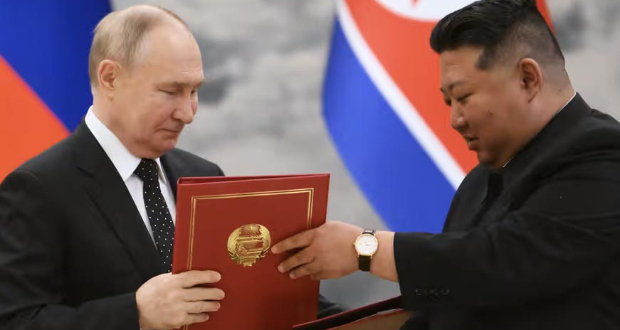On June 12, Kim Jong Un, the North Korean leader, penned a special message for President Putin for Russia Day, characterising their bilateral relations as a ‘far-reaching strategic relationship’. This description of ties between Pyongyang and Moscow symbolised a new bonhomie between the two leaders and marked a paradigm shift in Northeast Asian geopolitics. The exchange was soon followed by President Putin’s visit to Pyongyang, marking his first state visit to North Korea in 24 years. During the visit, the leaders signed a Treaty on Comprehensive Strategic Partnership. This treaty lists new areas of cooperation in North Korean and Russian ties. Most importantly, the treaty emphasises mutual security guarantees in the event of an attack, increasing the threat perceptions in Northeast Asia, especially in the security calculus of the United States (US), Japan, and South Korea.
The treaty emphasises mutual security guarantees in the event of an attack, increasing the threat perceptions in Northeast Asia, especially in the security calculus of the United States (US), Japan, and South Korea.
Comprehensive Strategic Partnership Treaty: What changes after the Treaty?
The recent signing of a Treaty on Comprehensive Strategic Partnership between the two countries replaces the 1961 and 2000 treaties and the 2000 and 2001 Moscow and Pyongyang declarations. The 2024 Treaty marks a crucial moment in the diplomatic ties between both states, reflecting a rapprochement in the relations and re-emergence of DPRK from its strategic isolation phase. In addition, this treaty elevates the relations between the two countries beyond the earlier areas of engagement (as seen in Table 1 below). Following the meeting, Kim Jong Un called it a ‘great event’ and said that ‘the conclusion of the treaty puts the relations of the two countries on a new higher stage.’ For Moscow, this treaty is the manifestation of the evolution of Russian foreign policy and a clear portrayal of its defence ties with Pyongyang.




